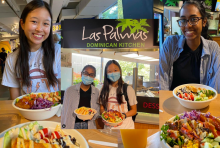New partnerships, support for sustainable foods, and community-based incubator. (February 2022)
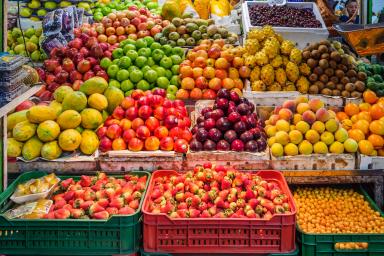
MITOS works to support a campus where everyone has access to healthy, affordable, and culturally meaningful food in an environment designed for social connection, sustainability, and innovation. Guided by MIT’s climate action plan, Fast Forward, and our 2018 Food & Sustainability Working Group report, we are working to procure sustainable food, build strong community partnerships, support pollinator habitats, lower the impact of our food-related greenhouse gas emissions, and more. Find out about these efforts below.
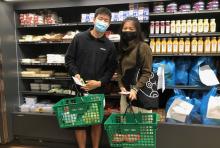
First-year students visit nonprofit grocer store and learn about food resources at MIT. (January 2022)

The Launchpad: MIT partners with nonprofit food incubator, CommonWealth Kitchen. (September 2021)

As we return to campus, thoughts on the role of food from students and staff. (August 2021)
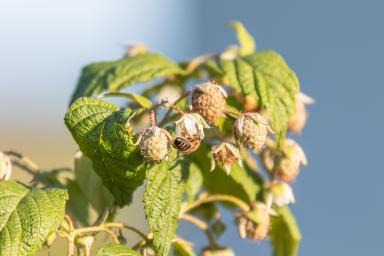
Food production and consumption are connected to climate change and carbon emissions at every level. Food is, therefore, listed as a priority commitment for decarbonizing the campus in MIT’s Fast Forward climate action plan, which states that MIT will establish a quantitative food goal in 2022. From tackling single-use disposable items, to providing more healthy, delicious plant-based options, to partnering with local food justice organizations, MITOS and MIT Dining will be in engaging the campus in conversation and working toward quantitative goals.
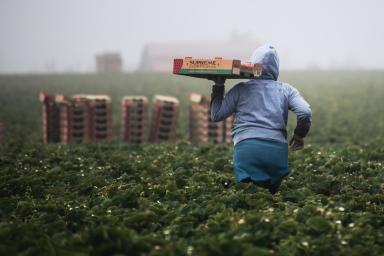
A sustainable food system also addresses the social, racial, economic, and environmental injustices embedded in food and farming. When solving for carbon and waste reductions, a sustainable food system also ensures access to affordable and culturally meaningful food, agricultural land, business opportunities, and safe working environments for all. MITOS is building relationships with organizations like CommonWealth Kitchen and the Daily Table, and works closely with MIT’s food security efforts. Visit DoingWell at MIT to learn about food security and financial resources.
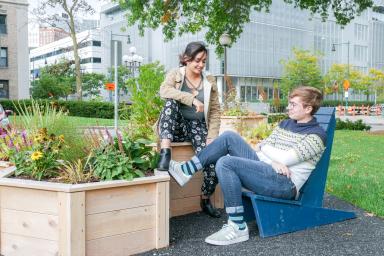
The Hive Garden on the Saxon Lawn is made up of pollinator-attracting plants - which bring awareness to the crucial role that bees, butterflies, birds, beetles, moths, and others play in sustaining our economies, food security, and environmental health. Stay tuned as MIT embarks on new projects related to growing food and the pollinators that make it possible. If you are on campus, get in touch if you would like to be involved.
MIT Food & Sustainability Working Group
The MIT Food & Sustainability Working Group examined the cultural, administrative and environmental dimensions of the MIT food system, resulting in a set of recommendations for operationalizing sustainability across campus life and operations in 2018. Read more here, or click below.
MIT Dining partners with Bon Appétit as its on-campus vendor for residential dining. As a company, Bon Appetit strives to achieve greater social responsibility and sustainability, which led them to launch their Farm to Fork program in 1999, a company-wide commitment to buying locally. MIT Dining also partners with retail vendors across campus including the new Launchpad at W20.
The MIT Recycling program manages on-campus food waste collection. This includes food waste from nearly 20 dining facilities. Additionally, some residence halls, particularly graduate dorms, collect food waste for composting. Currently, only food waste or plant material may be collected, due to limitations in regional infrastructure for processing compostable containers and silverware. Take a look at the MIT Materials Matters Dashboard to access campus waste data.
The Abdul Latif Jameel Water and Food Systems Lab (J-WAFS) funds MIT research, supports students, and brings global leaders together to solve water and food sector challenges.
Student initiatives such as the Food and Agricultural Club , which hosts an annual Innovation Prize , are also seeking to address elements of the food system on campus and globally.
MIT offers many on-campus resources related to food, wellness, and sustainability. These include the MIT Medical Community Wellness program as well as many classes during IAP and semester terms. Explore more:
MIT Medical
Community Wellness
IAP Classes
Energy, Environment, and Sustainability
Food and Beverages
Fitness
Wellness
Life Skills
Semester Classes
1.74 Land, Water, Food, and Climate
11.377 Food Systems and the Environment
24.03 Good Food: The Ethics and Politics of Food
21A.155 Food, Culture, and Politics
21W.012 Writing and Rhetoric: Food for Thought
21G.045 Global Chinese Food
STS.429 Food and Power
During the Spring, Summer and Fall the City of Cambridge supports seven farmers markets. Two spring to fall markets accept EBT/SNAP - the Central Square Market and the Harvard University Market. In addition, the Cambridge Winter Farmers Market at the Cambridge Community Center accepts EBT/SNAP.
In Somerville, the Somerville Winter Farmers’ Market (December-April) accepts SNAP/ EBT and HIP (Healthy Incentives Program). The Union Square Farmers’ Market in Somerville (May-November) also SNAP/EBT/Food Stamps, and several vendors also accept WIC and Elder Coupons.
Cambridge and Boston both have many additional farmers markets that are available throughout the week. Find a market near you:



